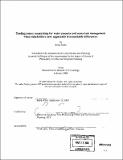Trading zones : cooperating for water resource and ecosystem management when stakeholders have apparently irreconcilable differences
Author(s)
Fuller, Boyd
DownloadFull printable version (23.61Mb)
Other Contributors
Massachusetts Institute of Technology. Dept. of Urban Studies and Planning.
Advisor
Lawrence Susskind.
Terms of use
Metadata
Show full item recordAbstract
Disputes over the management of water resources in the United States often seem irreconcilable because stakeholders' differences in values, beliefs, and identities are so hard to resolve. Yet, while many efforts to resolve such disputes fail to generate agreement, some do. Looking at these fundamental disagreements about how to manage water, this dissertation attempts to understand why stakeholders in some consensus building processes were able to generate and agree on specific solutions while in other they were not. Two extended disputes about how to manage regional water resources in California and Florida are the focus of this inquiry. In each case, decision-makers convened both collaborative efforts that reached agreement as well as efforts that failed. The findings from this study show that consensus building theory provides some useful explanations for why stakeholders were able to reach agreement in the face of their entrenched value-based differences. The experiences in the two case studies described here show that trading zone theory offers some needed insights that complement consensus building theory's focus on process structure, facilitation, and interest-based problem solving. In the processes that reached agreement in both cases, maps, words, spreadsheets, diagrams, expressions, and calculations were enerated by stakeholders following procedures they agreed were valid to describe the natural, political, cultural, and administrative situation on the ground. Like pieces of a puzzle, these partial representations were then combined and manipulated until stakeholders had constructed a vision of a future situation that they agreed was both desirable and feasible.
Description
Thesis (Ph. D.)--Massachusetts Institute of Technology, Dept. of Urban Studies and Planning, 2006. Includes bibliographical references (v. 2, leaves 364-369).
Date issued
2006Department
Massachusetts Institute of Technology. Department of Urban Studies and PlanningPublisher
Massachusetts Institute of Technology
Keywords
Urban Studies and Planning.